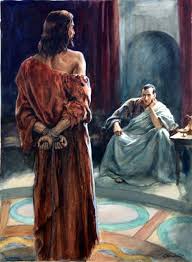
We all recall the famous scene from the Passion Narrative when Jesus tells Pilate that he came to speak truth. Pilate’s response? “Truth. What is Truth?” Are we not faced with that question every day? In the news we read. In decisions on raising our children. During legal proceedings. And, probably most importantly, in our conscience and our hearts. We all struggle to understand what is truth in our public and private worlds.
Once we come to grips with what we feel is truth, we then decide what to do with that truth. Do we just keep these beliefs internalized or do we speak them to the wider community? I guess that decision is based on how strongly we feel about the issue at hand and how confident we are that our view accurately reflects the truth. And does this truth reflect what we would view as an absolute truth? One that does not change regardless of the times or the circumstances.
Both readings today demonstrate the decision to speak the truth openly and the consequences of those decisions. The first reading is from the book of the prophet, Jeremiah. Jeremiah was called to speak to the house of Judah (the southern kingdom) at a very early age and he did so at a turbulent time in Israel’s history. The Babylonians had defeated Assyria and were closing in on Jerusalem. After the death of King Josiah, Judah had fallen back to idol worship and Jeremiah spoke out strongly against this practice. There was much division in terms of how Judah should respond to the threats it was facing. It was a nation in turmoil. And Jeremiah was tasked with revealing God’s truth to a nation that did not want to hear it.
John the Baptist’s audience was a bit more narrow when he spoke a truth that was not popular. He confronted King Herod and his, wife, Herodias, of their sin of Herod marrying his brother’s wife. Mosaic law forbade Herod from marrying his brother Phillip’s wife, even after each had divorced their respective spouses. This truth did not sit well with the parties involved, particularly Herodias. It got John thrown into prison.
In each of these two cases, the purveyor of the truth did not cease their proclamations even in the face of persecution. Ultimately Jeremiah was spared death for his prophecy but John literally lost his head over the matter. Truth has its price.
In our modern age we have platforms of pronouncement that Jeremiah could not even dream of. Radio, television, internet blogs and, of course, Facebook. In a sense, these opportunities have made prophets of us all. We can use these tools to evangelize and help to spread the Gospel. It is easy to post your opinion in a matter of seconds to a waiting word. But with this ability also comes great responsibility. Does what we say unite or divide? Do we not post something, that we feel strongly is truth, because of fear of retribution?
I don’t really have all the answers to these questions on what truth is or how to proclaim this truth. I would say that you are best able to find truth in God’s word and this word can be found through scripture, prayer, adoration, reconciliation, mass, etc. Being present to the Word every day and allowing some time in silence to listen to that Word.
And the question of when to share? I guess it is kind of like the question of knowing when you are in love. You just know and you cannot help but proclaim it to everyone who will listen. When the apostles were told that they could not preach the Gospel, or even say Jesus’ name in public, they replied that they could not be quiet about something so important. They went on to speak in spite of the risks that these actions posed.
In the end I guess the formula from the beginning of time to the present is to “Seek the Truth and then Speak the Truth”. Do so with respect and patience but also without fear. Remember Matthew 10:28:
“Do not be afraid of those who kill the body but cannot kill the soul. Rather, be afraid of the One who can destroy both soul and body in hell.”
